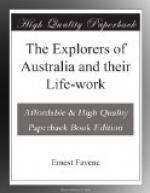The party had been tantalised by threatening clouds, which never broke in rain. When on the third day they gathered once more, black and lowering. Baxter urged Eyre to camp that night instead of pushing on, as rain seemed certain, and the rock holes by which they were then passing were well adapted to catch the slightest shower. Eyre consented, against his better judgment. It was necessary to watch the horses lest they should ramble too far, and Eyre kept the first watch. The night was cold, the wind blowing a gale and driving the flying scud across the face of the moon. The horses wandered off in different directions in the scrub, giving the tired man much trouble to keep them together. About half-past ten he drove them near the camp intending shortly to call the overseer to relieve him.
Suddenly the dead stillness of the night and the wilderness was broken by the report of a gun. Eyre was not at first alarmed, thinking it was a signal of Baxter’s to indicate the position of their camp. He called, but received no answer. Hastening in the direction of the shot, he was met by Wylie, the King George’s Sound native, running towards him in great alarm crying out: “Oh, massa, massa, come here!” and then losing speech from terror. Eyre was soon at the camp, and one glance was enough to see that his purpose must now be pursued grimly alone. Baxter, fatally wounded, was stretched upon the ground, bleeding and choking in his last agony. As Eyre raised his faithful companion in his arms he expired.
“At the dead hour of night, in the wildest and most inhospitable waste of Australia, with the fierce wind raging in unison with the scene of violence before me, I was left with a single native, whose fidelity I could not rely on, and who, for aught I knew might be in league with the other two, who, perhaps were even now lurking about to take my life, as they had done that of the overseer.”
On examining the camp, Eyre found that the two boys had carried off both double-barrelled guns, all the baked bread and other stores, and a keg of water. All they had left behind was a rifle, with the barrel choked by a ball jammed in it, four gallons of water, forty pounds of flour, and a little tea and sugar.
When he had time to think the matter over calmly, Eyre judged, from the position of the body, that Baxter must have been aroused by the two natives plundering the camp, and that, getting up hastily to stop them, he was immediately shot. His first care was to put his rifle into serviceable condition, and then, when morning broke, he hastened to leave the ill-omened place. It was impossible to bury the body of his murdered companion; one unbroken sheet of rock covered the surface of the country for miles in every direction. Well might Eyre write, many years afterwards:—
“Though years have now passed away since the enactment of this tragedy, the dreadful horrors of that time and scene are recalled before me with frightful vividness, and make me shudder even now when I think of them. A lifetime was crowded into those few short hours, and death alone may blot out the impressions they produced.”




